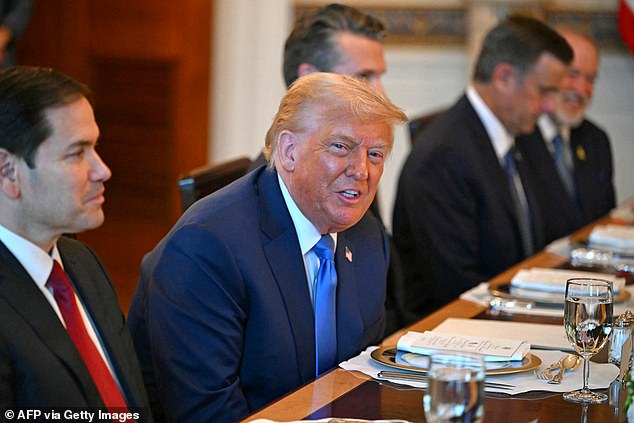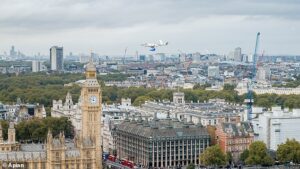
Israeli Prime Minister Benjamin Netanyahu handed President Donald Trump a letter nominating him for the Nobel Peace prize at a dinner Monday, a gesture that ostensibly took the president by surprise.
‘It’s nominating you for the Peace Prize, which is well deserved, and you should get it,’ the Israeli leader told Trump, just days after Israel and Iran agreed to a ceasefire after 12 days of fighting and a U.S. bombing of the Islamic republic’s nuclear facilities.
‘This I didn’t know,’ Trump responded after thanking Netanyahu.
‘Coming from you in particular, this is very meaningful,’ Trump told Netanyahu, who said he had sent the nominating letter to the Nobel Prize Committee.
Trump has long been known to covet the prize, and his allies have continued to push the issue, even as both boasted about the military attacks that ‘obliterated’ Iran’s nuclear facilities.
It happened at a meeting in which Trump said Iran wants to return to the negotiating table, perhaps as early as next week.

President Donald Trump meets with unseen Israeli Prime Minister Benjamin Netanyahu at the Blue Room of the White House in Washington, DC, where Netanyahu said he had nominated Trump for the Nobel Prize
Trump confirmed Iran requested a meeting and he agreed to attend, expressing optimism about negotiations while not ruling out further military action.
He denied any holdup in Gaza ceasefire talks, saying “things are going along very well.”
Trump then shifted to discuss recent Israel-Iran tensions, describing it as an unpleasant period where “every single missile was shot out of the air.” When asked about his controversial plan to relocate Palestinians from Gaza, he deferred to Netanyahu.
He also gave an unexpected response about sending weapons to Ukraine, contradicting his press secretary’s earlier defense of the administration’s evaluation process.
‘We’re going to send some more weapons. We have to,’ he said.’ He said they were ‘primarily’ defensive weapons, because Ukraine is being hit ‘very hard.’ He repeated his statements that he was ‘disappointed’ in his call with Russian President Vladimir Putin.

Trump spoke at length about Israel, Iran, Gaza, and other issues at a dinner with Israeli PM Benjamin Netanyahu

Israeli Prime Minister Benjamin Netanyahu looks on during a bilateral dinner with U.S. President Donald Trump, at the White House in Washington, D.C., U.S., July 7, 2025

A view shows the rubble after the Israeli army carried out a nighttime attack on Yafa School, located in the Al-Tuffah neighborhood in the east of the Gaza Strip, on June 30, 2025

Netanyahu presented a letter he said he sent the Nobel Peace Prize committee nominating Trump

Trump denied there was a holdup in a deal to end the war in Gaza
House Republican allies of Trump have also been talking up a peace prize nomination for the president, and Trump has been pointing to his own efforts to settle shooting between nuclear powers India and Pakistan. ‘We stopped a lot of fights,’ Trump said.
Trump’s dinner with Netanyahu was part of strategy session to determine a way forward with Iran after the president joined Israel’s assault on its longtime nemesis.
A solution to the ongoing war in Gaza, which Israel began after the brutal October 7 attacks inside Israel, has proved elusive.
‘The utmost priority for the president right now in the Middle East is to end the war in Gaza and to return all of the hostages,’ Leavitt told reporters ahead of the leaders’ private dinner.
She said Trump wants Hamas to agree to a US-brokered proposal ‘right now.’
Trump’s special envoy Steve Witkoff is set to join talks in Doha later this week as the war approaches the two-year mark.
The meeting is the third between Trump and Netanyahu this year.
Yet the outwardly triumphant visit will be dogged by Israel’s 21-month war against Hamas in Gaza and questions over how hard Trump will push for an end to the conflict.
Trump has made clear that following last month’s 12-day war between Israel and Iran he would like to see the Gaza conflict end soon. The meeting between Trump and Netanyahu could give new urgency to a U.S. ceasefire proposal being discussed by Israel and Hamas, but whether it leads to a deal that ends the war is unclear.

Trump has met with Israeli PM Benjamin Netanyahu three times this year
Before departing for Washington on Sunday, Netanyahu praised the cooperation with the U.S. for bringing a ‘huge victory over our shared enemy.’ He struck a positive note on a ceasefire for Gaza, saying he was working ‘to achieve the deal under discussion, on the terms we agreed to.’
‘I think that the discussion with President Trump can certainly help advance that result, which all of us hope for,’ Netanyahu said.
White House officials are urging Israel and Hamas to quickly seal a new ceasefire agreement that would bring about a 60-day pause in the fighting, send aid flooding into Gaza and free at least some of the remaining 50 hostages held in the territory, 20 of whom are believed to be living.
Leavitt announced on Monday that Witkoff will travel later this week to Doha, Qatar, for ceasefire and hostage talks.
But a sticking point is whether the ceasefire will end the war altogether. Hamas has said it is willing to free all the hostages in exchange for an end to the war and a full Israeli withdrawal from Gaza. Netanyahu says the war will end once Hamas surrenders, disarms and goes into exile – something it refuses to do.
Demonstrators, including hostage family members, gathered outside the U.S. Capitol before the leaders’ meeting to press for the release of all remaining hostages in any agreement.
‘We cannot accept a deal for a partial release,’ said Ilan Dalal, father of Guy Gilboa-Dalal. ‘A partial deal would mean that some of the hostages will stay in the tunnels for more time and this would be a death sentence.’

White House press secretary Karoline Leavitt fielded questions about tariffs and the push to end the war in Gaza Monday

A demonstrator holds a smoke flare, during a protest to demand the immediate release of all hostages held in Gaza since October 7, 2023 attack on Israel by Hamas, near the U.S. Consulate in Tel Aviv, Israel, July 7, 2025
Trump has been pressuring Israel and Hamas to wrap up the conflict, which has killed more than 57,000 Palestinians, ravaged Gaza, deepened Israel´s international isolation and made any resolution to the broader conflict between Israel and the Palestinians more distant than ever.
But the precise details of the deal, and whether it can lead to an end to the war, are still in flux. In the days before Netanyahu´s visit, Trump seemed to downplay the chances for a breakthrough.
Asked on Friday how confident he was a ceasefire deal would come together, Trump told reporters: ‘It changes from day to day.’
On Sunday evening, he seemed to narrow his expectation, telling reporters that he thought an agreement related to the remaining hostages would be reached in the coming week.
Those mood swings also have embodied Trump´s relationship with Netanyahu.
As recently as Netanyahu´s last visit to Washington in April, the tone was markedly different.
Trump used the photo-op with Netanyahu to announce that the U.S. was entering into negotiations with Iran over its nuclear program – appearing to catch the Israeli leader off guard and, at the time, slamming the brakes on any Israeli military plan.
Trump, whose policies have largely aligned with Israel’s own priorities, pledged last week to be ‘very firm’ with Netanyahu on ending the war, without saying what that would entail. Pressure by Trump has worked on Netanyahu in the past, with a ceasefire deal having been reached right as the president was taking office again.
Netanyahu has to balance the demands of his American ally with the far-right parties in his governing coalition, which hold the key to his political survival and oppose ending the war.
But given the strong U.S. support in Israel’s war against Iran, highlighted by joint airstrikes on a fortified underground Iranian nuclear site, Netanyahu may have a tough time saying no.
Trump also may expect something in return for his recent calls for Netanyahu’s corruption trial to be canceled – a significant interference in the domestic affairs of a sovereign state.
‘Trump thinks that Netanyahu owes him,’ said Eytan Gilboa, an expert on U.S.-Israel affairs at Bar-Ilan University near Tel Aviv. ‘And if Trump thinks that he needs to end the war In Gaza, then that is what he will need to do.’
Trump on Sunday told reporters he continues to look for a ‘permanent deal’ with Tehran to ensure Iran doesn’t try to restart its nuclear program.
Iran’s President Masoud Pezeshkian in an interview published Monday said the U.S. airstrikes so badly damaged his country´s nuclear facilities that Iranian authorities still have not been able to access them to survey the destruction.
Pezeshkian added in the interview with conservative American broadcaster Tucker Carlson that Iran would be willing to resume cooperation with the U.N. nuclear watchdog but cannot yet commit to allowing its inspectors unfettered access to monitor the sites.
‘We stand ready to have such supervision,’ Pezeshkian said. ‘Unfortunately, as a result of the United States´ unlawful attacks against our nuclear centers and installations, many of the pieces of equipment and the facilities there have been severely damaged.’
Netanyahu is slated to meet Tuesday with Republican House Speaker Mike Johnson.





